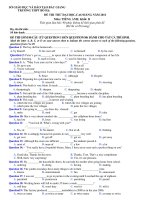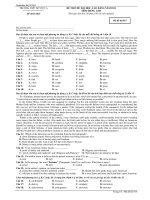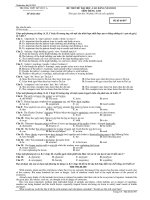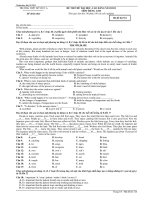ĐỀ THI THỬ ĐẠI HỌC, CAO ĐẲNG NĂM 2011 MÔN TIẾNG ANH - Mã đề thi 140 potx
Bạn đang xem bản rút gọn của tài liệu. Xem và tải ngay bản đầy đủ của tài liệu tại đây (202.49 KB, 4 trang )
Trang 1/4 - Mã đề thi 140
TRƯỜNG THPT MỸ ĐỨC A
Đề chính thức
ĐỀ THI THỬ ĐẠI HỌC, CAO ĐẲNG NĂM 2011
MÔN TIẾNG ANH
Thời gian làm bài: 90 phút; (80 câu trắc nghiệm)
Mã đề thi 140
Họ, tên thí sinh:
Số báo danh:
Chọn một phương án đúng (A hoặc B, C, D) điền vào chỗ trống để hoàn thành mỗi câu sau, từ câu 1 đến câu 25
Câu 1: Not until 1856 ___________ across the Mississippi River.
A. was the first bridge built B. the first bridge was built
C. the bridge building was D. the first building a bridge
Câu 2: The cost of living has ___________ over 10 percent in the past years.
A. raise B. rising C. raised D. risen
Câu 3: Now men and women remain single longer than they once ___________.
A. doing B. do C. were done D. did
Câu 4: He ___________ on his English study all yesterday evening.
A. was working B. used to work C. had worked D. working
Câu 5: These chairs are ___________ better than the others.
A. either B. as C. much D. very
Câu 6: Why did Berth ask you ___________ a bicycle?
A. that you had B. that if you had C. do you have D. if you had
Câu 7: Malaria is a disease ___________ by the anopheles.
A. transmitting B. transmit C. transmitted D. is transmitted
Câu 8: "Is swimming under water very difficult?" - "No, it’s just a matter ___________ able to control your breathing."
A. of being B. to be C. being D. that you are
Câu 9: Come with me. I’m seeing “ The killer” tomorrow. ___________
A. Do you? B. Will you? C. Shall you? D. Are you?
Câu 10: No one has ever asked me that question before.
In the passive voice: _______________________________
A. That question has never been asked me before by anyone. B. I have not ever been asked that question before.
C. I have never been asked that question before. D. That question has ever been asked me by no one before.
Câu 11: Our teacher said “The Second World War broke out in 1939”.
Indirect speech: _______________________________________
A. Our teacher said us that the Second World War had broke out in 1939.
B. Our teacher told us that the Second World War had broken out in 1939.
C. Our teacher told that the Second World War had broken out in 1939.
D. Our teacher said that the Second World War broke out in 1939.
Câu 12: "What’s it ___________?" - "A flute."
A. told B. spoken C. called D. said
Câu 13: The girls and flowers ___________ he painted were vivid.
A. which B. whose C. who D. that
Câu 14: All night long people danced and sang. They did it ___________.
A. in all the night B. during the whole night C. in the night D. the night long
Câu 15: After he ___________ work, he went straight home
A. has finished B. had finished C. had been finishing D. would finish
Câu 16: "What did you think of the book?" - "___________ the books I’ve read, it was the most interesting."
A. From all B. All C. Of all D. All of
Câu 17: "I can’t see the stage very well from here." - "___________."
A. Neither can’t I B. I can’t neither C. Neither I can D. Neither can I
Câu 18: I applied for the job that I saw ___________ in the paper.
A. advertising B. be advertised C. being advertising D. advertised
Câu 19: He looked like such a fool with his hair dyed green that I just _________ laughing at it.
A. couldn’t enjoy B. couldn’t help C. can’t help D. didn’t stop
Câu 20: I __________ more money on teachers if I __________ the Minister of Education and Training.
A. spent / was B. would spend / were C. would spend / did D. will spend / were
Câu 21: Do you know any restaurants ____________?
A. where we can have a really good meal B. where have a really good meal
C. that we can have a really good meal D. which has a really good meal
Câu 22: Sally was very disappointed with the exam result. She ____________ a bad mark before.
A. had got B. never had got C. had ever got D. had never got
Câu 23: My sister and I __________ the piano when our guests __________ last night.
A. played / arrived B. had played / arrived
C. were playing / arrived D. were playing / were arriving
Câu 24: Have you seen the place _____________ the graduation ceremony will be held in?
A. where B. which C. is where that D. in that
Câu 25: Her mother told her not to be too __________ and advised her to try to do things herself.
A. dependable B. dependent C. depending D. independent
Trang 2/4 - Mã đề thi 140
Đọc kỹ đoạn văn sau và chọn một phương án đúng (A, B, C hoặc D) để trả lời câu hỏi hoặc điền vào chỗ trống, từ 26 đến 30
THE WILDLIFE
Wild animals, plants and the wild places where they live are seriously threatened. One species has become extinct in each year
of this century. But many hundreds are now in danger. Lack of attention would lead to the rapid advance of the process of
extinction.
Already many kinds of wild animals have been so reduced in number that their role in the ecosystem is forgotten. Animals like
the great apes, the whales, seals etc. are thought to be in danger of extinction.
But even more important, perhaps than individual kinds of animals and plants, whole habitats are in danger of vanishing:
marshes are being drained, and the world forests, especially tropical forests are being cut down to satisfy man's needs of timber
and paper.
What would our world be like if all the wild animals and wild plants vanished?- Would our life still exist then?
Câu 26: What would happen to the human beings if the wildlife vanished?
A. The human life would be seriously threatened. B. Many species would quickly become extinct.
C. Species would go on dying out. D. Tropical forests would be cut down.
Câu 27: What is more important than individual kinds of animals and plants?
A. the rapid advance of the process of extinction. B. the vanishing of whole habitats.
C. the extinction of many species. D. man’s need of timber and paper.
Câu 28: What does the writer caution us against?
A. draining marshes. B. hunting wild animals.
C. destroying our environment. D. cutting down the tropical forests.
Câu 29: "What would happen if we cut down forests?" - "Cutting down forests would cause __________.
A. both the changes of temperature and the floods B. the changes of temperature
C. the floods D. neither the changes of temperature nor the floods
Câu 30: "To threaten” in the passage means "__________________".
A. to pollute B. to vanish C. to give fear to D. to poison
Chọn một phương án đúng (A, B, C hoặc D) tương ứng với một câu thích hợp nhất được tạo ra bằng những từ / cụm từ gợi ý,
từ 31 đến 35
Câu 31: / important / it / stop / patient / smoke / drink / at once //
A. It’s important that the patient stops smoking and drinking at once.
B. It’s important that the patient should stop smoking and drinking at once.
C. It’s important that the patient stops to smoke and drink at once.
D. It’s important that the patient should stop to smoke and drink at once.
Câu 32: / balcony / high building / good / view / football match //
A. The balcony of the high building can make the football match better to view.
B. From the balcony of the high building, we can have a better view of the football match.
C. From the balcony of the high building, the football match can have a good view.
D. The football match can view the balcony of the high building quite well.
Câu 33: / police’s warnings / people / refuse / helmets //
A. Despite the police’s warnings, many people still refuse to wear helmets.
B. Because of the police’s warnings, many people refuse wearing helmets.
C. Thanks to the police’s warnings, many people still refuse of wearing helmets.
D. Even though the police’s warnings, many people refuse not to wear helmets.
Câu 34: / ages / be / they / go / Da Lat //
A. It has been ages when they last went to Da Lat. B. It has been ages when they have gone to Da Lat.
C. It seems to be ages since they last went to Da Lat. D. Since they have gone to Da Lat, they have been ages.
Câu 35: / computer / run / ten time / fast / this / old one /
A. This ten times computer runs faster than the old one. B. This computer runs ten times faster than the old one.
C. This computer runs fast ten times than the old one. D. This computer runs faster ten times than the old one
Chọn một phương án đúng (A, B, C hoặc D) tương ứng với một (cụm) từ gạch chân cần phải sửa, từ 36 đến 45
Câu 36: The early we leave, the sooner we will arrive.
A. The early B. arrive C. leave D. the sooner
Câu 37: George has not completed the assignment yet, and Maria hasn’t neither.
A. hasn't neither B. assignment C. yet D. has not
Câu 38: Tree squirrels are active, noisy, and lively animals that make its home in tree trunks.
A. that B. noisy C. its D. lively
Câu 39: The Charles Dickens’ character Wilkins Micawber lived in optimistic expectation of a best fortune.
A. character B. optimistic C. lived D. a
Câu 40: Daisy has such many things to do that she has no time to go out.
A. to go B. has C. to do D. such
Câu 41: Dinosaurs became extinct millions of years ago because of the earth's climate changed drastically.
A. became extinct B. the earth's C. because of D. drastically
Câu 42: My brother has always helped me in time of need, and I wish that he was here now.
A. was B. has always helped C. in time D. need
Câu 43: Many charity organizations have brought food supplies and clothes to flood-effecting areas in the Mekong Delta.
A. food-effecting areas B. have brought C. charity D. the
Câu 44: After Tom returned to his house, he read a book.
A. he B. read C. returned D. to his house
Câu 45: Our former teacher told us not talk while the teachers were explaining the lesson.
A. told B. not talk C. former teacher D. were explaining the lesson
Trang 3/4 - Mã đề thi 140
Chọn một phương án (A, B, C hoặc D) có phần gạch chân phiên âm khác với các từ còn lại, từ câu 46 đến câu 47
Câu 46: A. parachute B. character C. chemistry D. mechanic
Câu 47: A. biscuits B. newspapers C. magazines D. vegetables
Chọn một phương án (A, B, C hoặc D) là câu viết lại gần nghĩa nhất so với câu đã cho, từ câu 48 đến câu 57
Câu 48: "Do you believe in what the boy says, Mary?" said Tom.
A. Tom asked Mary if she believed in what the boy said. B. Tom asked Mary to believe in what the boy said.
C. Tom asked Mary whether she believes in what the boy says. D. Tom said that Mary believed in what the boy said.
Câu 49: John is fat because he eats so many chips.
A. John is fat though he eats so many chips. B. If John didn’t eat so many chips, he would not be fat.
C. Being fat, John eats so many chips. D. If John doesn’t eat so many chips, he will not be fat.
Câu 50: People say he won a lot of money on the lottery.
A. He was said to win a lot of money on the lottery. B. He won a lot of money on the lottery, it is said.
C. He is said that he won a lot of money on the lottery. D. He is said to have won a lot of money on the lottery.
Câu 51: She is learning English because she wants to get a better job.
A. She is learning English so that she will be able to get a better job.
B. She is learning English so that she gets a better job.
C. She is learning English so as she gets a better job.
D. She is learning English in order she can get a better job.
Câu 52: "I am sorry, I forgot our appointment yesterday," said Jean to the dentist.
A. Jean apologized to the dentist for having forgotten our appointment the day before.
B. Jean apologized the dentist having forgotten their appointment the day before.
C. Jean apologized the dentist for having forgotten our appointment the day before.
D. Jean apologized to the dentist for having forgotten their appointment the day before.
Câu 53: After the members of the committee had had lunch, they discussed the problem.
A. Having been served lunch, a discussion of the problem was made by the members of the committee.
B. Having been served lunch, it was discussed by the committee members of the problem.
C. Having been served lunch, the problem was discussed by the members of the committee.
D. Having been served lunch, the committee members discussed the problem.
Câu 54: If only I had studied hard last term.
A. I regret because I studied hard last term. B. I regret not studying hard last term.
C. I wish I studied hard last term. D. I regret not to study hard last term.
Câu 55: You can only pass the next exam by studying as hard as you can.
A. The only to pass the next exam is studying.
B. Only by studying as hard as you can can you pass the next exam.
C. Only by studying as hard as you can can help you pass the next exam.
D. You can have only one way to pass the exam, which is studying.
Câu 56: The students in my class no longer work as hard as they used to.
A. The students in my class used to work harder than they do. B. The students in my class didn't work hard any longer.
C. The students in my class are working harder than before. D. The students in my class didn't use to work hard.
Câu 57: That was a very funny story which made everybody laugh.
A. That was a very funny story which everybody was made to laugh.
B. That was a very funny story which everybody was made laughing.
C. That was a very funny story by which everybody was made to laugh.
D. That was a very funny story by which everybody was made laughing.
Đọc kỹ đoạn văn sau và chọn một phương án đúng (A, B, C hoặc D) để trả lời câu hỏi hoặc điền vào chỗ trống từ 58 đến 62
To a European, money means power, the freedom to do as he likes, which also means that, consciously or unconsciously, he says:
“I want to have as much money as possible myself and others to have as little money as possible.”
In the United States, wealth was also acquired by stealing, but the real exploited victim was not a human being but poor
Mother Earth and her creatures who were ruthlessly plundered. It is true that the Indians were expropriated or exterminated, but
this was not, as it has always been in Europe, a matter of the conqueror seizing the wealth of the conquered, for the Indian had
never realized the potential riches of his country. It is also true that, in the Southern states, men lived on the labor of slaves, but
slave labor did not make them fortunes; what made slavery in the South all the more inexcusable was that, in addition to being
morally wicked, it didn’t even pay off handsomely.
Thanks to the natural resources of the country, every American, until quite recently, could reasonably look forward to making
more money than his father, so that, if he made less, the fault must be his; he was either lazy or inefficient. What an American
values, therefore, is not the possession of money as such, but his power to make it as proof of his manhood; once he has proved
himself by making it, it has served its function and can be lost or given away. In no society in history have rich men given away so
large a part of their fortunes. A poor American feels guilty at being poor, but less guilty than an American renter who had
inherited wealth but is doing nothing to increase it; what can the latter do but take to drink and psychoanalysis?
Câu 58: Which of the following can be concluded from the first paragraph?
A. Some people not only want to get rich but wish others to be poor.
B. Money is made either consciously or unconsciously.
C. Some European acquire money and power without even being conscious of it.
D. Those who have a lot of money enjoy real freedom.
Câu 59: To an American, money means ___________.
A. The freedom to do whatever he likes B. proof of ability and manhood
C. diligence and efficiency D. "proof of ability and manhood" and "diligence and efficiency"
Câu 60: The author seems to believe that the natural resources in the U.S. are _________.
A. poor B. limited C. rich D. on the increase
Trang 4/4 - Mã đề thi 140
Câu 61: In the passage, the word “fortunes” (Paragraphs 2 and 3) is used twice. What does it mean?
A. luck B. good opportunities C. wealth D. power
Câu 62: In the author’s opinion, an American renter __________.
A. should feel more guilty than a poor American B. should feel content with this inherited wealth
C. is even lazier and more inefficient than a poor American D. will take to drink if he does nothing to increase his wealth
Đọc kỹ đoạn văn sau và chọn một phương án đúng (A, B, C hoặc D) để trả lời câu hỏi hoặc điền vào chỗ trống, từ 63 đến 67
The first cause of global greenhouse gas emissions is over-population. In 1950, the world population was 3 billion, now 6.5
billion people who produce an enormous output of waste and utilize an unbelievable amount of resources and energy. Most people
having children have no idea why they are even having children. Most do not really love their children because if they did, they
would be very much involved in trying to ensure that their children have a world to survive in. Unless overpopulation is addressed,
there is no way of slowing down greenhouse gas emissions. But corporations need workers, governments need taxpayers,
bureaucrats and soldiers. More people means more money. The solution to all of our problems is simple. We just need to live in
accordance with the basic laws of ecology. Weaken diversity and the entire system will be weakened and will ultimately collapse.
All of the species within an ecosystem are interdependent. There is a limit to growth because there is a limit to carrying capacity.
Human populations are exceeding carrying capacity and diminishing resources and diversity of species. Albert Einstein wrote that
"if the bee disappeared off the surface of the globe, then man would have only four years of life left. No more bees, no more
pollination, no more plants, no more animals, no more man." And the honey bee is disappearing. Why? We do not know why. All
around the world bees are disappearing and bees pollinate our plants. We are cutting down forests and plundering the oceans. We
are polluting the soil, the air and the water and rapidly running out of fresh water to drink. Water is now being sold for more than
the equivalent amount of gasoline.
Câu 63: The passage is about _________.
A. the decreasing of the world's population B. overpopulation and its effect
C. an important part of bees in overpopulation D. bees and human beings
Câu 64: Overpopulation __________.
A. has no effects on human beings B. is a good results
C. leads to greenhouse gas emissions D. has good effects to resources
Câu 65: According to the writer __________.
A. human beings can live independently from other species B. children can grow up without their parents' care
C. growth is limited D. the more people survive on earth, the more resources are used
Câu 66: According to Albert Einstein, without bees ____________.
A. all human beings would die immediately B. human life on earth would be better
C. man would disappear soon D. human beings could survive in only 4 years
Câu 67: Which action is NOT referred in the text?
A. We are raising more and more bees. B. We are cutting down forests.
C. We are polluting the air and water. D. We are plundering the oceans.
Chọn một phương án (A, B, C hoặc D) có trọng âm chính ở vị trí khác so với các từ còn lại, từ câu 68 đến câu 70
Câu 68: A. secretary B. intelligent C. necessary D. comfortable
Câu 69: A. computer B. accurate C. instruction D. destroy
Câu 70: A. achievement B. arrangement C. enclosure D. reference
Đọc kỹ đoạn văn sau và chọn một phương án đúng (A, B, C hoặc D) cho mỗi chỗ trống, từ 71 đến 80
People in many countries grow fresh water fish from eggs. They move the small fish into lakes and rivers. The fish live and
___71___ there. People go ___72___ in these lakes and rivers. They enjoy catching fish because fish is also good food. Now the
Japanese grow salt water fish. Most of them are yellow tail fish. Workers grow the fish from eggs. Every time they feed the fish,
they play ___73___ of piano music. The fish ___74___ that piano music means food. When the fish are small, the Japanese put
them into the ocean near the land. The fish find some of their ___75___ food. Workers also feed them. They play the same piano
music. The fish ___76___ know the music. They swim toward it and ___77___ the food. In ___78___ months the fish are large.
The Japanese play the same music. The fish swim toward it and the workers ___79___ them. The Japanese get about 15 percent of
their seafood ___80___ farms in the ocean.
Câu 71: A. develop B. born C. bread D. grow
Câu 72: A. fishing B. shopping C. enjoying D. catching
Câu 73: A. lot B. songs C. tapes D. films
Câu 74: A. think B. realize C. recognize D. learn
Câu 75: A. own’s B. self C. own D. self’s
Câu 76: A. mostly B. nearly C. already D. recently
Câu 77: A. find B. hold C. bite D. see
Câu 78: A. few B. many C. a few D. couple
Câu 79: A. hold B. grasp C. seize D. catch
Câu 80: A. from B. on C. in D. of
HẾT









